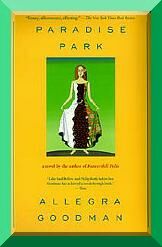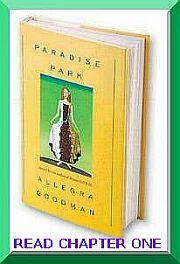«
Paradise Park Reviews
»

Season's readings: 'Paradise Park'
Sunday, April 01, 2001
By Sharon Dilworth
"Allegra Goodman's new novel is a rare treat. It's one of those novels that get more interesting as it unfolds. The development of character, the abundant details and the graceful language make for a surprising
and refreshing read...."
THE REST OF THIS REVIEW

Review by Chris McMahon
"Faith is a very personal and customized phenomenon. In a quest for God, one often has to kiss a lot of frogs before discovering the prince. Such is the experience of Sharon Spiegelman, the lovely and confused heroine of Paradise Park, Allegra Goodman's latest novel. Sharon's journey begins in her early 20s. After her boyfriend ditches her in a cheap hotel in Honolulu, Sharon must decide where her life is going. She is a young hippie with a guitar, her grandfather's watch, and a macramé bikini."
Read the Boulder Weekly Review Here


A Caged Bird, Singing
Allegra Goodman's heroine seeks a spiritual path in the modern world
"Goodman has a wonderful sense of humor, and part of the novel's extended joke is the contrast between its paradisiac setting and its heroine's inner turmoil. Birds, caged and free, are constantly appearing as metaphors for Sharon's feelings, and paradise is occasionally deceptive: Sweet, yellow guavas look wonderful, but inside, 'ten thousand swarming black maggots would be feasting and pillaging on the pink guava flesh.'"
Read the Review at The San Francisco Chronicle

Moadon HaSefer HaTov (Book Club)
"Sharon Spiegelman double-knots the top of her macrame bikini so that she doesn't lose it in the surf. It's the mid-1970s, and she's a recent arrival in Hawaii; it's as though she were washed up on shore to begin a long and tangled journey home.
Allegra Goodman's new novel, Paradise Park (Dial) opens with the folk-dancing, guitar-playing, long-haired Sharon waking from a mystical dream in a fleabag hotel in Waikiki. She has just been dumped by the boyfriend she followed from Boston to Portland, Oregon and then to Berkeley and further west to Hawaii. Her spiritual return trip takes her all over the Hawaiian islands, to Israel, Crown Heights in Brooklyn, and to Sharon, Massachusetts, over more than twenty years. Her shifts in clothing – and readers follow her wardrobe, from bikini, tank tops and gauze skirts, to a long denim skirt, long-sleeved blouse and a borrowed lace-covered apricot satin bridesmaid dress with dyed-to-match shoes – parallel the many abrupt changes in her lifestyle as she searches for although at first she can't name it –God's Presence.

Art by Laurel Burch
Throughout the novel, the author layers on details, often with humor and satire, building a world around her characters. It's easy to imagine Goodman having a good time writing this, as she creates a Hawaiian meditation center with an edgy New York-born guru, or the synagogue – whose rabbi has a license plate reading SHALOHA – where Sharon teaches Israeli folk dancing to seniors in muumuus and leotards.
This is a coming-of-age story, with Sharon ultimately connecting to a havurah-style Judaism, after experimentation at the Greater Love Salvation Church, at a yeshiva in Israel where she finds the teaching for women more about home economics than spirituality and among the welcoming Bialystoker Chasidim, whom she first encounters in Hawaii when they establish a Chai House – not unlike a Chabad House – and later in Brooklyn. Often, Sharon trips up over her own earnestness.
As Goodman explains in an interview with The Jewish Week, several fictional genres inspired her writing. She sees this novel as a combination of a confessional, citing Augustine's work, a picaresque novel and an adventure story. In terms of voice, she mentions Huck Finn, "a voice so lively and real, you feel that the person telling the story to you is in the room."

This is Goodman's first novel written in the first person. She agrees that she had a lot of fun inhabiting Sharon's being while writing, seeing the world through Sharon's eyes. For Goodman, character and voice are important starting points for her fiction. Readers may remember encountering Sharon in Goodman's story Onionskin, published in The New Yorker in 1991 and later included in the 1998 edition of her collection, Total Immersion.
That story, which Goodman describes as one of her favorites, was in the form of a letter from Sharon to her religion professor at the University of Hawaii. "I found it compelling to take the moment, and build what came before, what came after," she explains.
"Some of the comedy is at Sharon's expense, some at others. She's good at puncturing pretension when she sees it," Goodman says, and adds, referring to readers: "I just hope people have fun with it."
As in her previous novel, Kaaterskill Falls and her linked stories, The Family Markowitz, Goodman writes naturally and knowingly about Jewish tradition and Jewish practice. Here, she's again exploring themes like community, forgiveness, religious structures, spirituality, the hunger for tradition and for meaning.

If Paradise Park had a theme song, it might be the Song of Songs, which appears, in different ways, throughout the novel. Before she understands the meaning of the Hebrew words, Sharon is folk dancing to its melodies, and, later, its metaphors lace her conversation. Goodman explains that she's long been fascinated with the text, particularly with the image of the figure running around, lost, desperately seeking a lover, 'I see Sharon as that kind of figure: rushing, foolish, young, with so much passion and desire, looking for God and looking for love.'
Now over 30 and the mother of three sons, Goodman is still known for her early success, publishing her first volume of stories on the day she graduated from Harvard. She's already won major awards, including the National Foundation for Jewish Culture's Cultural Achievement Award in Literary Arts, a Whiting Award and the Wallant prize for the best work of Jewish-American fiction. She's now working on another novel, set in the third person.
At the time that Paradise Park is set, Goodman was a child growing up in Hawaii. She has memories of people who would show up on the islands, after moving as far west as they could on the mainland of the U.S. This breed of adventurers who seemed to be at the end of their rope – and recreating their lives from scratch – has long interested her. Paradise Park is infused with that sprit of resiliency.

The real Paradise Park is an all-bird zoo with walk-in aviaries and staged bird shows in Hawaii, where Goodman would go on school field trips. Sharon sees the birds there living in total harmony, yet questions, "If the structure is imposed from the outside, how can a place be a true utopia? A real paradise, that would that have to come from inside the birds themselves; that would come from their own hearts.
For Sharon, the search for an alignment of heart and soul – her kind of paradise – finally ends, or rather, goes on, happily."
~Sandee Brawarsky

ESCAPE CLAUSE
By Emily White
Read the Village Voice Review Here

Lisa Schwarzbaum's Review
".....I love the women of Allegra Goodman's wise short-story collections Total Immersion and The Family Markowitz, and I love her lithe, compassionate novel Kaaterskill Falls (a 1998 National Book Award finalist) for the grace with which the author weaves commitment to religion with a humor born of tolerance for the essential, profound, evolving crazy-mixed-upness of women and American Jewishness.......
Sharon is a notable departure from Goodman's family-oriented heroines -- a young woman estranged from blood relatives. Her parents are divorced, her brother dead, and her spiritual interests grow as much from her need to create family out of friends, lovers, and workmates as they do out of a hunger in her soul."
Entertainment Weekly Review

Seeker in
new novel zips off
to Hawaii via Berkeley
ALEXANDRA J. WALL
Jewish Bulletin Review


Art by Laurel Burch

By Bella Stander
"Self-delusion has rarely been so hilariously and poignantly embodied as in hippy-dippy dharma bum Sharon Spiegelman...."
Read Her Review Here

The Literal Mind
"'PARADISE PARK,' the latest novel from Allegra Goodman, author of the acclaimed 'Katerskill Falls,' is an odyssey -- a colorful, quirky odyssey that takes one pie-eyed spiritual seeker halfway across the world and back on a quest to find God. Like all good odysseys, Sharon Spiegelman's journey brings her back to the beginning -- but changed, humbled and enlightened...."
Drew Cherry's Review Here

Allegra Goodman heroine learns a Song of Sharon
"The joy of this Huck Finnish, picaresque coming-of-age novel by the author of Kaaterskill Falls (1998) and The Family Markowitz (1996) is in the alchemy that emerges between the voice of the mercurial and inquisitive narrator and her two-decade-long pilgrimage to discern an intelligible and benign Supreme Being
in a silent universe -- and to apprehend
a purpose to her own
effervescent existence..."
Harvey Grossinger's Review


Looking for Love
By Jennifer Schuessler
"Sharon Spiegelman, the heroine-narrator of Allegra Goodman's second novel, is on a lifelong tear through the world in search of God, and you've got to pity the poor soul who gets stuck sitting next to her on the bus. Abandoned in a fleabag hotel in Waikiki sometime in the mid-1970's by her folk-dancing partner, with little more than a macramé bikini to her name, she throws herself into a chaotic, all-consuming quest for human and divine love (though ''just because you are on an odyssey, is there something wrong with once in a while having a hot meal?'' she wonders). One afternoon on a whale-watching boat, the sea opens up and delivers a vision of God -- all the power under the world, all this presence and wisdom that wasn't human.'' It's a revelation that sets her bouncing from New Age fixes to variations on the old-time religions. Sharon's a supreme flake and unholy jawboner, driving everyone around her crazy with her questions and declarations and constant, vehement changes in course. She writes letters to John Denver and talks to dolphins, lizards and her surly adopted alley cat, Marlon. She tends to hear them talking back."
Read the rest of this NY Times review

The Unbearable Lightness of Seeking
Allegra Goodman's Paradise Park explores the spiritual path of flaky self-absorption....
Review at Killing the Buddha

Seeking spiritual fullness with a blithe touch
"Some writers were born under lucky stars. Others are immensely talented. And still others are both. Allegra Goodman — the acclaimed author of the National Book Award finalist "Kaaterskill Falls" — falls into this last category. She’s an author of exquisite talent who has had the good fortune to be recognized early and well for her preternaturally accomplished writing. (Goodman first made her mark in 1989 when she graduated from Harvard University and had her first short story collection published on the same day.) Goodman’s strength lies in her ability to take on big issues while quietly baring small truths along the way. Goodman’s latest novel, "Paradise Park," is appealing for its honed prose and for its main character’s breezy, chatty, breathy recounting of a life spent wandering.....

The book opens with a lovely couple of sentences that bode well for the reader and portend the crux of the novel: "All this light was pouring in on me, and I started to open my eyes. I didn’t know where in the world I was, and I reached over, but no one was there." When she is a young woman, Sharon’s spiritual interior is depopulated, and although she spends many years trying to fill it up, she finally comes to the realization that the light was pouring into her all that time. Goodman has captured the spiritual striving and unease that we all have experienced. And she does it so blithely."
Read the rest of Heather Lee Schroeder's review



|
|
|